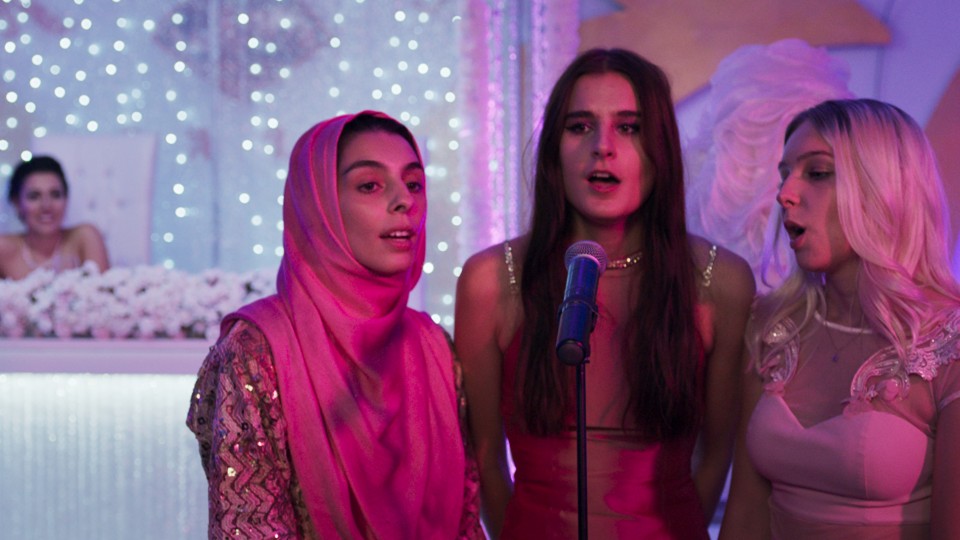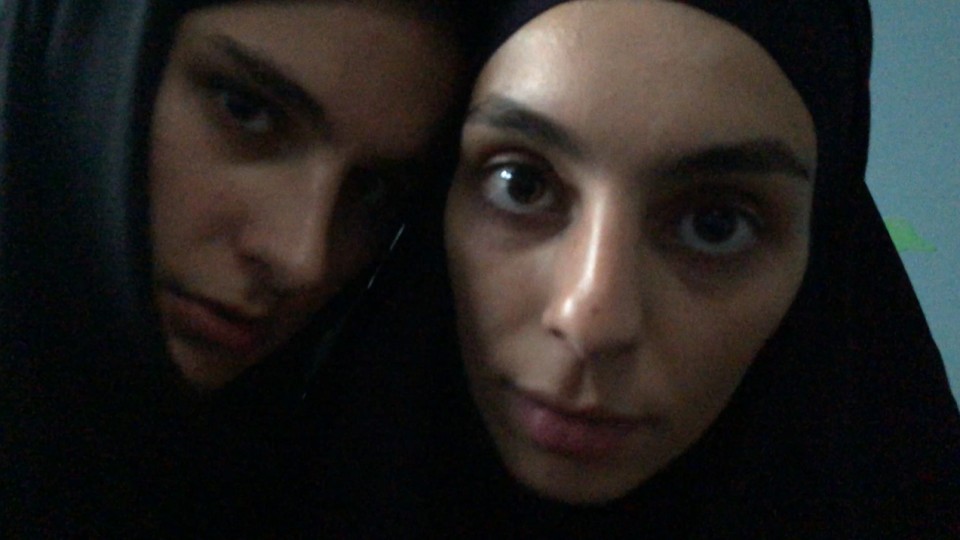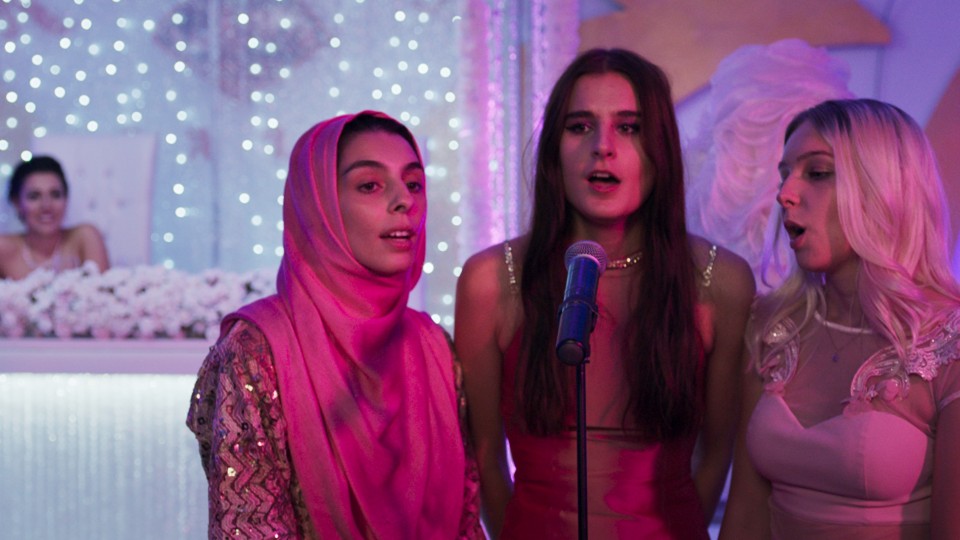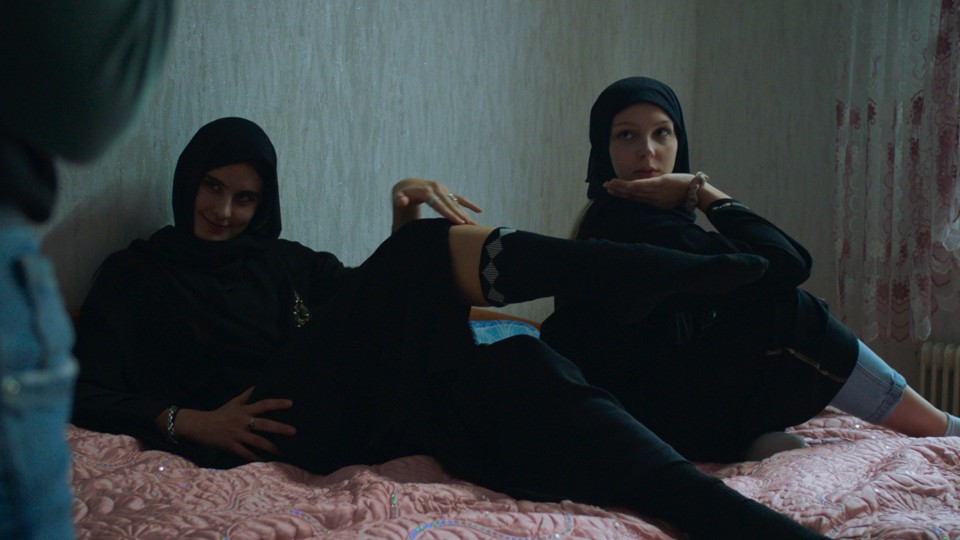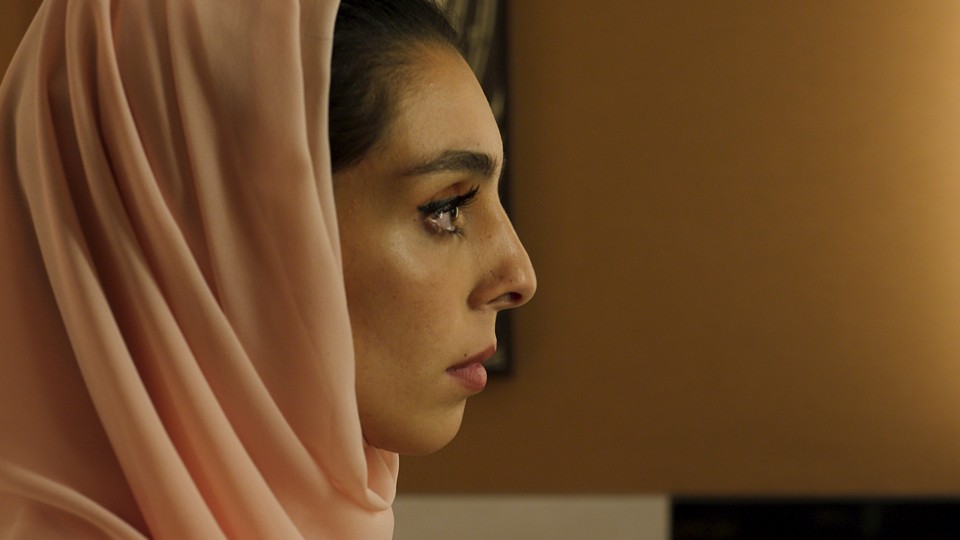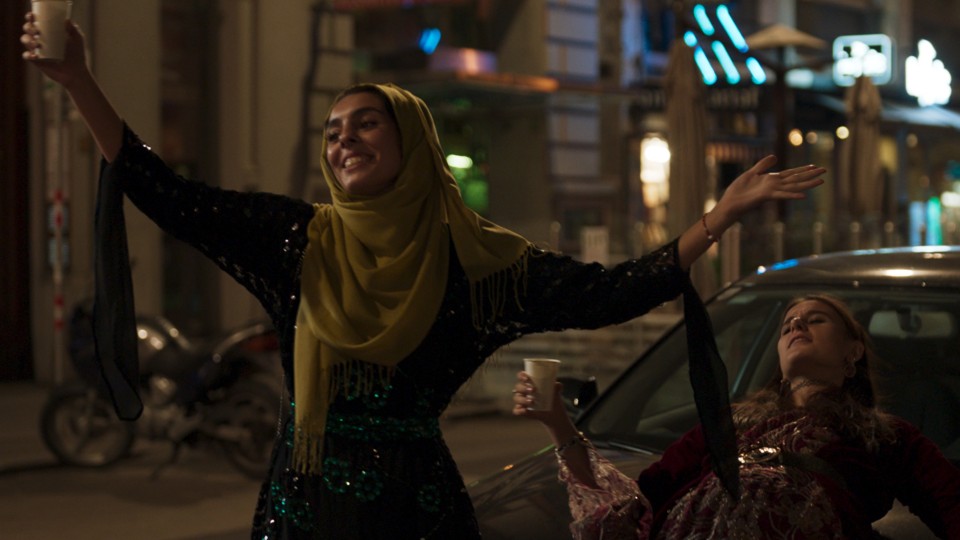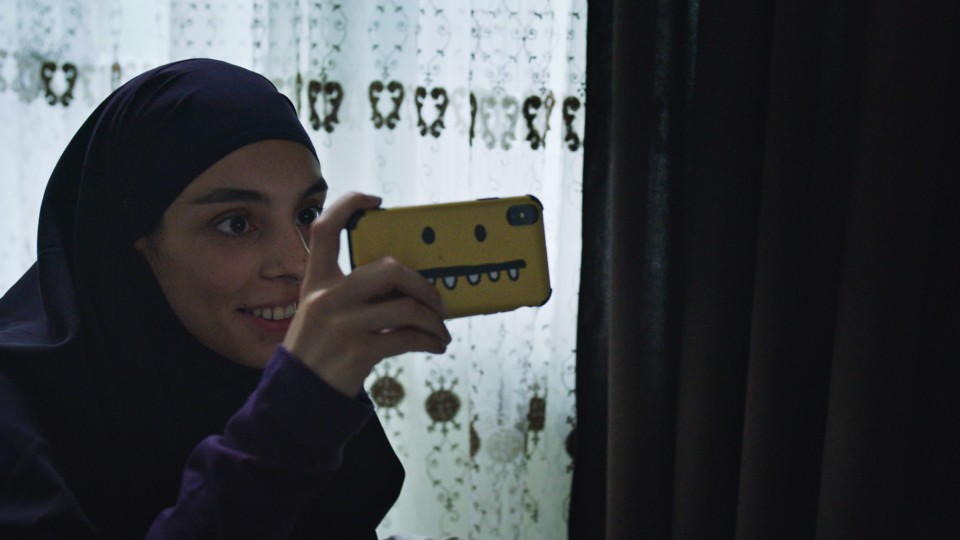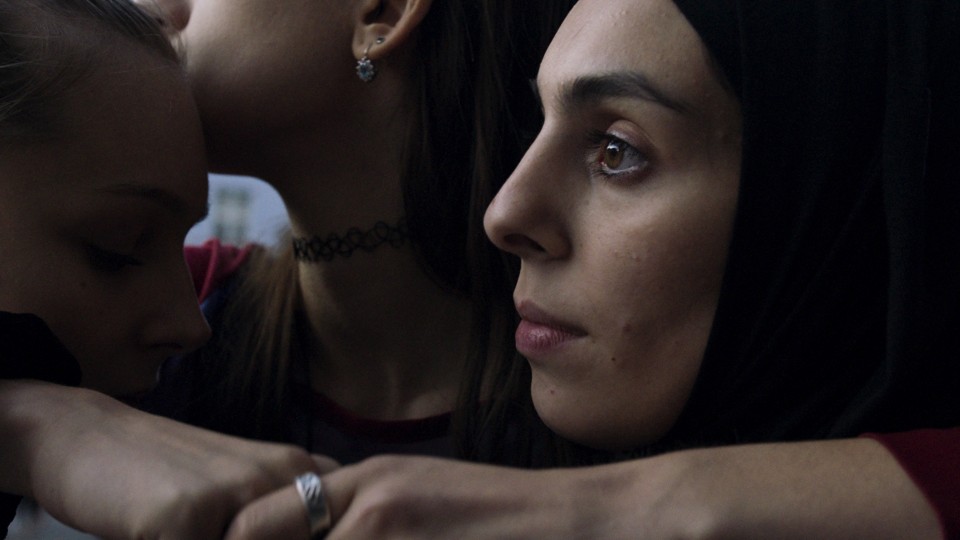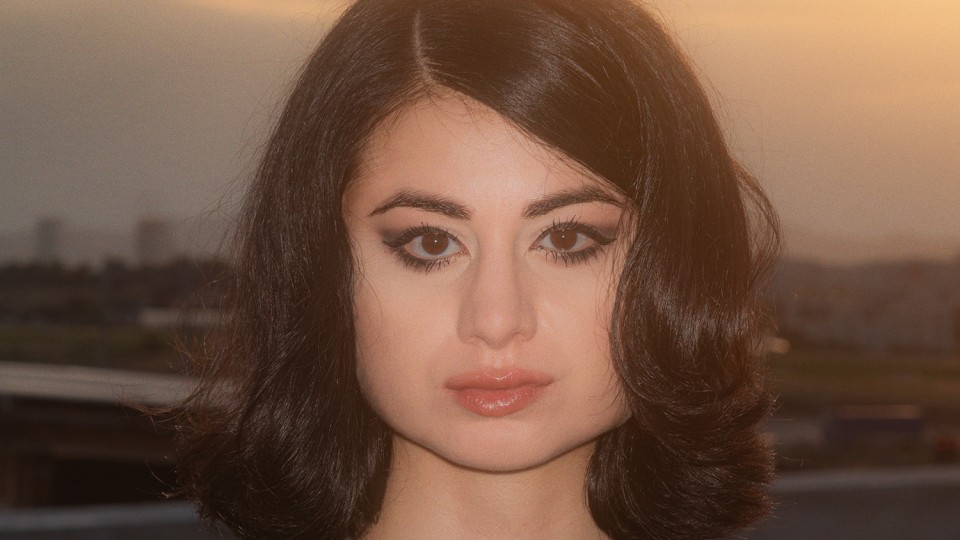How are you supposed to belong anywhere if you are born in one country and grow up in another, if one culture is dominant
in the family and another at school? If a particular look is all the rage on digital channels this week but a different one
next week, and if you record a video with girlfriends that goes viral only to discover that this suddenly drives a wedge between
you? In her feature film debut SONNE Kurdwin Ayub follows three 17-year-olds through the chaos of our time.
In your Director’s Statement for SONNE you mention that you don’t see many films which reflect the chaos of our time. What
do you feel is the nature of that chaos, especially for the generation that is the focus of attention in SONNE?
KURDWIN AYUB: I’m thinking above all of the social media chaos and the question of how you define your identity: what you want be, how
you want to look, where you want to feel you belong. In SONNE I have attempted to depict that realistically, because I don’t
find it anywhere else. Usually the approach to this situation is romantic, or too fictional. I instigated a lot of improvisation
and gave the young people the opportunity to hold the camera themselves and film each other, and I think that’s what gives
the film its connection to reality.
So it is predominantly about visible chaos surrounding appearance and how people present themselves?
KURDWIN AYUB: Definitely. Next week I want to be this, and two weeks later I want to be different again. SONNE is an amusing, chaotic take
on the current teen generation, combined with cultural “identification difficulties”. In our artistic and cultural bubble
people don’t attach much importance to Instagram influencer body ideals, but for most girls out there the desire to be sexy
like the influence girls is widespread. And if we talk a lot about feminism in our bubble without actually appreciating that,
we don’t realise it’s a bigger problem “out there”.
How much of a challenge was capturing this current chaos in a screenplay for a full-length feature film?
KURDWIN AYUB: Tapping into this chaos wasn’t so difficult, because I’m part of the chaos myself. I mean, it goes with my age. When I was
growing up suddenly Myspace appeared, and we were all connected to one another virtually for the first time. I wanted to be
a Myspace star as well. Facebook and Instagram didn’t come along until later. Writing a screenplay is fundamentally hard because
it means working and revising a text over years. But the basic idea for the narrative was there from the very start, and that’s
what I built on.
What was that basic narrative concept?
KURDWIN AYUB: I wanted to tell the story of three girls, friends who make a YouTube video where they perform a pop song for fun wearing
headscarves. The video goes viral. What happens then is that two of the girls become much more interested in this “fame” while
Yesmin, my main protagonist, doesn’t: in contrast to the others, she comes from a Muslim Kurdish background. And just as the
band Tic Tac Toe broke up very dramatically,
I wanted these three friends to split up with a bang. Yesmin begins to distance herself from her friends but also from her
own culture. Naturally telling a story always has something to do with yourself. I myself experienced some of the individual
details in the story.
You said you also wanted to become a Myspace star; do you still remember what motivated you? Why does somebody want to become
famous on the Internet?
KURDWIN AYUB: Nowadays, when I analyze the way I used to be, I think there was a very strong cultural influence on my upbringing. I wasn’t
allowed to go out, to spend time with boys, and I think I sought refuge in the Myspace world. But I can’t talk for other people.
If you grow up in Simmering then you only move in the world of Simmering, but if you’re on Myspace, you can reach a lot more
people and construct a universe for yourself that doesn’t necessarily correspond to reality. Generally somebody’s virtual
self is what they would like to be. I think there’s a certain amount of pressure as well. If everyone else is doing it, and
they all have cool lives on the platforms, then you want to do it too.
You have worked with young women who are about 10 years younger than you. Has anything changed again in that time?
KURDWIN AYUB: Yes, it has. I have the feeling that in the generation 10 years younger than me, which is mainly on Instagram, everyone is
on the same page. There are fewer subcultures, or maybe there are others that I don’t know. While I was working with school
classes I got the impression that everyone is aiming for the same look, the same style of clothes. It was like a huge H&M
shop window. I think that’s because Instagram can be accessed from anywhere. And that’s where young people all over the world
get their idea of “the way you’re supposed to be”. I remember 10 years ago there were more subcultures: punks, indies, emos
I also think the sexual attributes have changed: big asses and lips, narrow waists. In the Asian region people have started
to construct digital influencers that look very genuine: perfect digital people that have masses of fans. They’re used by
the brands, they don’t get old, they don’t cost anything, and you can do anything you like with them. And I’m certain it’s
difficult to achieve an idea like that.
The video that the three friends make, which goes viral, is their interpretation of the REM song Losing My Religion from 1991. To what extent does the title also convey Yesmin’s emotional position?
KURDWIN AYUB: My three girls are very cool girls, and the 90s trend is everywhere at the moment. I was thinking to myself: how could they
go viral, if they are smart? And I came to the conclusion that they should sing Losing My Religion in headscarves. Yesmin’s story plays with this. From the very start Yesmin isn’t very devout. But she’s stuck in the system.
I wanted to tell a different story to the distancing-yourself-from-your-culture one.
Which clichés have you attempted to combat?
KURDWIN AYUB: I wanted to get right away from the cliché of the girl in a headscarf who suffers terribly because of her wicked parents,
and above all I wanted to turn the image of the strict father and the good-natured mother on its head. A lot of minor aspects
are incorporated in the individual scenes. Yesmin isn’t the girl in the class who is not cool; her father wants her to go
to university; her brother isn’t allowed to do anything, but as the older sister she can.
What did your young actors have to master in order to get through the auditions?
KURDWIN AYUB: I’d worked with Law Wallner on previous projects and done a lot of preparatory work and mobile videos with Melina Benli (Yesmin)
and Maya Wopienka. So I already knew my main cast very well. The people who joined them had to be natural, to be able to improvise
and adapt to things in the auditions, and – which was particularly important to me – to be funny and smart on camera. I always
say I don’t cast actors: I cast personalities. And if I really like somebody, I adapt the character in the screenplay to them.
Using mobile footage is more than an aesthetic decision. How did you and Enzo Brandner organize the camerawork between phones
and cameras?
KURDWIN AYUB: I chose Enzo Brandner as DOP because he’s so good at working with hand cameras. He’s like an action cameraman, and he can
hold the camera for a very long time. For the mobile footage the girls themselves often held the camera. Enzo brought more
style and composition to the mobile sequences, but he also understood very quickly how to get that sloppiness in the images.
And often the youngsters held the phones themselves, to make it more real. In general terms I think phone videos are very
beautiful, from a colour and artistic perspective, whether they’re by Enzo, the young people in the film or the big wide world
of the Internet.
Are belonging and the desire to belong the central themes that preoccupy the young women?
KURDWIN AYUB: The film shows that everyone feels a bit lost. I don’t really belong anywhere either. I’m not really Austrian, even if I
feel like that, and I’m not a real Kurd either. In that sense I don’t have any identity at all. If I ask myself where I come
from, then it’s my family, the housing project in Simmering where I grew up. Other people know where they come from. I don’t
know that feeling, and neither does Yesmin. As far as Bella and Nati are concerned, Yesmin’s two girlfriends, I can’t say
whether they feel they belong anywhere culturally. Perhaps in a virtual, international world people don’t think nationally
so much, which would be cool. Bella and Nati are unhappy in their lives and with their families; they feel abandoned, lost,
and that’s why they search for warmth somewhere else. The fast life can be confusing: there are too many desires, too many
ideals, too much that’s cool and sexy – but too little you can achieve unless you are born with it or born into it.
An important symbol in your story is the headscarf – a piece of material which triggers so many discussions, reactions and
expectations. What was your thinking behind that?
KURDWIN AYUB: I really wanted to look at the headscarf as just a piece of material. When Yesmin takes off her headscarf it’s not an extremely
meaningful act. When Yesmin and her friends dance with it, they’re trying to be provocative and sexy. Why not? Why can’t a
woman in a headscarf be sexy, or funny? When I think about the issue of wearing a headscarf among my relatives, I get the
feeling it’s not such a big thing. They put it on. Full stop. In my cultural circle it’s a normal thing, and there isn’t
much talk about it. I think here in Europe a lot more fuss is made about it. In the Koran it says that a woman has to be protected
because she is such a wonderful being. And protected from the wild animal: man and his lusts. The Koran was written before
the Middle Ages. These days some things have changed. The idea that she has to hide herself is a mistaken interpretation.
The question of the attitude people should have to the headscarf is also part of the chaos in our complex world, and in the
film.
Interview: Karin Schiefer
December 2021

